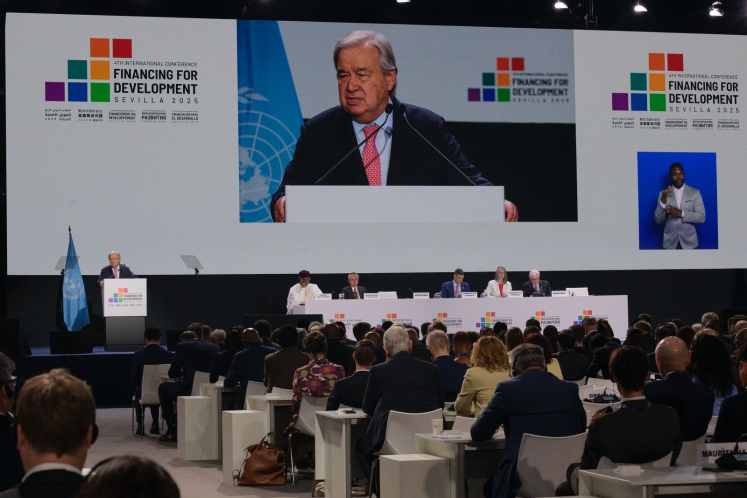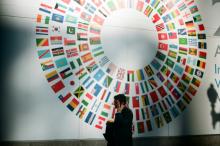This blog was originally published by Friedrich-Ebert-Stiftung.
It’s been just over a month since the Fourth International Conference on Financing for Development (FFD4) in Seville - and many are wondering what the financial system will look like for the Conference to be a judged a success 10 years from now at FFD5.
Ideally, a financial architecture, economic governance and development cooperation system that enables impact, equity and resilience, and is responsive to emerging threats and opportunities; a system that recognizes shared responsibilities while being more reflective of an evolving geopolitical and geoeconomic world order; and a trusted system that is more inclusive, transparent, grounded in mutuality and delivering on national as well as shared development objectives and wellbeing for all, especially those most in need.
At a time of rising debt, declining investment and escalating trade wars, however, our ability to deliver on this vision looks increasingly uncertain. It’s estimated, for instance, that 3 billion people now live in countries that spend more on interest payments than on health or education. Ten years ago, at FFD3, in Addis Ababa, the main mantra popularized at that conference was "billions to trillions"; the idea that investment and financing for achieving the “post 2015” development agenda, as it was being called at the time, could be mobilized at scale. This has clearly not borne out and countries now face an estimated $4 trillion annual financing gap to meet the SDGs.
But rather than a sense of despair and hopelessness, Seville was an important reminder that there are practical solutions, resolve and ingenuity we can tap into – helping us to move beyond the upheavals and failures of the past decade, accelerate implementation of the SDGs and create more equitable and inclusive economic systems. I, like many, am cautiously encouraged by what happened in Seville and the positive conversations and ideas for boosting involvement in sustainable development, addressing the debt crisis and giving countries in the Global South a stronger voice in international financing architecture.
Here’s three important takeaways that signal how multilateralism can meet the moment.
What started in Seville … should not end in Seville
The week began in the Opening Plenary with formal adoption by more than 190 Member States of the inter-governmentally negotiated outcome document – officially known as the Compromiso de Seville, or Seville Commitment (having been advanced by consensus weeks prior during the fourth Preparatory Committee). This meant both official and unofficial proceedings could focus on implementation, giving the sense that FFD4 was only a beginning.
Despite the blistering heat, delegates dashed between the two pavilions of the venue – and sometimes across town - to join the Plenaries, Multi-Stakeholder Roundtables and Special Events of the official programme, and the more than 450 on- and off-site solutions-oriented side events. Discussions at the conference were both engaging and encouraging yet also candid and critical of areas where the Commitment falls short, including: the lack of tangible reforms to the international financial architecture, continued overreliance on the private sector and no formal debt restructuring mechanism (though its establishment of a Borrower's Forum is welcome by many).
Encouraging of forward momentum, the multi-stakeholder Seville Platform for Action (SPA), a wide-ranging collection of 130 commitments and concrete initiatives, some pre-existing and some new, ranging from debt swaps to global public investments and local currency lending, was developed to support implementation of the Commitment. Among the notable initiatives: A Global Coalition led by the UK and Bridgetown Initiative to scale up pre-arranged financing from 2 to 20% by 2035; a Hub for debt swaps hosted by the World Bank; a blended finance platform – SCALED – led by a coalition of countries including Germany and South Africa and financial insurance institutions including AXA and Zurich; and a Platform for country driven approaches led by the Integrated National Financing Frameworks (INFF) network. And beyond the high-profile Seville Platform, there were likely hundreds, maybe thousands, of other transactions, deals, partnerships and collaborations spawned by the conference.
As Carlos Cuerpo, Spain’s Economy Minister declared at the closing press conference, “Seville will be remembered not as a landing zone, but as a launchpad for action, to improve livelihoods across the world. Together, we have sent a strong message of commitment and trust in multilateralism that can yield tangible results to put sustainable development back on track.”
Leave no one behind … diversify leadership
Like the SDGs themselves, the Seville outcomes sought to be, and many would say succeeded, in being inclusive on many levels. There were headline, high-level official and unofficial deliberations and dialogues on gender, youth and future generations – led and driven to some extent by diverse and representative leaders across government, civil society and the private sector. At the same time, many civil society groups, especially in the Global South, expressed that the process and outcome failed to meet their expectations and ambitions.
Moreover, Seville arguably marked a turning point in the structure and governance of development cooperation - with implications for future multilateral processes. The United States withdrew from the process altogether at the final Preparatory Committee in June, allowing the other Member States to forge ahead (nearly unanimously), to endorse a Commitment that included important elements the U.S. was opposed to – on gender, climate, sustainability and references to the 2030 agenda. The absence of the United States ultimately created space for others to lead; the willingness and readiness of other diverse Member States and regional institutions, including regional development banks, and Global South actors was palpable.
To this end, fostering and enabling South-South, and triangular cooperation, was prominent on the Seville agenda and features robustly in the Commitment; including for example pledges by Member States “to enhance the impact and effectiveness of South-South Cooperation (SSC), guided by the principles of respect for national sovereignty, national ownership and independence, equality, non-conditionality, non-interference in domestic affairs and mutual benefit”. Concrete actions outlined in the Commitment, such as regional financing mechanisms that facilitate cross-border investment, resource mobilization, and knowledge sharing among developing countries will also help “ensure SSC is more sustainable, demand-driven and aligned with national development priorities.”
A forward-looking, integrated financing architecture
Taken together, the Commitment, Platform for Action, and results-oriented dialogue in Seville signal consensus that development financing must be fairer and create fiscal space that allows governments to invest in growth, social programs and resilience, create jobs, and support future generations. Achieving these objectives will require expanded engagement of and partnership with the private sector and market systems – including new business models, delivery mechanisms and accountability safeguards that leverage science and technology, particularly AI, while providing decent work and social protections. Similarly, public and private institutions must live up to expectations and pledges, and act with urgency to alleviate debt and lower the cost of capital – including with the use of innovative financial instruments.
FFD4 reminded us of the integrated and interdependent nature of development challenges (and opportunities) – which requires international cooperation and appropriate financing models. While issues concerning debt, private sector, domestic resource mobilization and international financial architecture dominated the agenda – especially given the parallel International Business Forum and SDG Investment Fair, which drew in additional business and finance executives – there was also attention (though some say not enough) to other concerns, including inequality, the climate crisis, energy transitions, data governance, infrastructure development, the digital economy, health, and fragility and conflict.
Time will tell, but there are follow-on processes in place, including the annual ECOSOC Forum on Financing for Development, to monitor and gauge implementation and action on the collective ambition and commitments made in Seville. Ultimately, FFD4 has the potential to show that multilateralism can meet the moment and deliver for people, planet, peace and prosperity.
Suggested citation: Nicole Goldin., "Multilateralism Meeting the Moment: Moving forward from FFD4," UNU-CPR (blog), 2025-08-15, 2025, https://unu.edu/cpr/blog-post/multilateralism-meeting-moment-moving-forward-ffd4.


